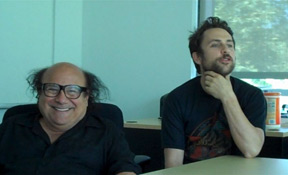Beat Sheets and Act Structure for Television Drama
As the tales of Don Draper, Walter White and Dexter Morgan come to an end and screenwriters everywhere struggle to create the next great TV protagonist, I have only one question.
Where are all of the “beat sheets” and structure “paradigms” for television drama?
There’s approximately nine million books on feature film screenwriting (I counted) and as many structural templates; hell, I’ve written a few of them. But since I started my intensive study of television structure, I’ve been shocked to find no such paradigm exists for the one-hour drama. I’m not talking about formula, I’m talking about form – an overview of the most commonly found and crucial characteristics of the “tentpole” beats of the one-hour pilot, broken down into the popular four or five-act structure used by most of the top one-hour TV dramas.
It’s not like there’s a dearth of TV coverage out there — every showrunner has a Twitter account, and every blogger who writes about TV can’t help but mention the phrase “Television’s New Golden Age” every other day. There’s just way too much analysis of television drama going on for there not to be a focused, simple-to-follow structural paradigm for one hour TV dramas!
I mean, seriously, why can’t I find a TV beat sheet that will help me to break down and better understand Game of Thrones, Downtown Abbey and The Good Wife?
Don’t get me wrong. There’s some great books on TV writing out there, but none that I can find that offer the kind of detailed, active, emotional roadmap that we find in the best screenwriting primers. You can criticize these paradigms all you want, but the fact is that they have helped countless writers to find their way into the screenplay form. They offer a glimpse into how professional writers structure their screenplays, and this analysis is irrefutable, in my opinion – just look at any cross-section of popular films, from Oscar contenders to indie hits to summer popcorn blockbusters, and you will see a very similar framework in use. Not formula. Form.
This is the subject matter I’ve been studying and writing about for many years, so when I turned my attention to analyzing the television drama, I was surprised to find a lack of information in this vein.
There was only one conclusion: I had to write my own one hour television beat sheet. It was time to get serious. So I chugged a pot of black coffee, did three sets of knuckle push-ups, sat down on the couch and picked up the remote. Yes, I have a tough job.
In studying some of the great shows on air today, especially the pilot episodes that launched these fantastic series, I’ve outlined a structural paradigm that you can use to better develop and plot an original pilot (a great pilot being the one thing you MUST have if you hope to launch a career in TV writing). I presented it for the first time in my webinar “Inside the TV Drama: Writing the Best Shows on Television,” presented by The Writers Store. You can follow that link to purchase an archived recording of the webinar (note: if that link is no longer working, go to the Recorded Webinars section at The Writers Store).
This is just the beginning. In the coming months, I will be sharing more of my deep analysis of television structure, in one form or another (blogs, e-books, live talks, etc.), so stay tuned.
I believe that television is at a vital crossroads. More shows are being produced and shown on more platforms than ever, and many of the landmark series of recent years are coming to the end of their runs. It’s time for new worlds, characters, themes and dramatic devices to be introduced by new creative minds from outside the established system. We’ve had our fill of compelling antiheroes, and the ride has been fun. Their names are iconic: Tony Soprano, Don Draper, Walter White, Dexter Morgan, to name a few. But their time is rapidly passing.
Your time has just begun. So start that pilot, today, not tomorrow, because we need your voice on TV. But remember one thing…
Just as we know from writing movies, the same is true of television: You can only reinvent the form once you know the form. In this case, the classic structure of what I call the “Prestige” TV drama. Once you know the past, you can create the future.The next, great Golden Age of TV.
Good Luck and Happy Writing,
Dan Calvisi
Related: Interview with Diane Kruger, star of The Bridge
Related: My Lady Cop Can Beat Up Your Man Cop (The Bridge, The Closer, Law & Order: SVU)
Related: Writing a TV Pilot (Nurse Jackie) guest blog from Sandra Leviton & Miranda Sajdak
Related: More on TV Writing
“Dan has a no-nonsense approach to screenplay analysis that cuts through the bull and delivers the goods. A must read for serious screenwriters.”
-J. Stephen Maunder, Writer/Director





Leave a Reply
Want to join the discussion?Feel free to contribute!